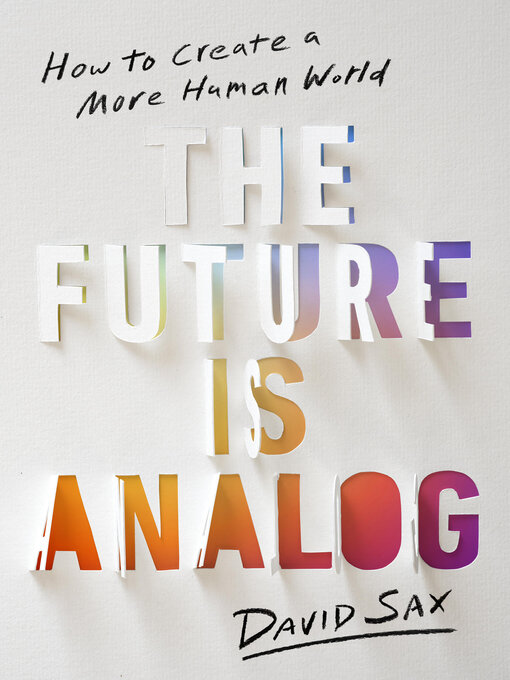In The Future Is Analog, David Sax points out that the onset of the pandemic instantly gave us the digital universe we’d spent so long anticipating. Instant communication, online shopping, virtual everything.
It didn’t take long to realize how awful it was to live in this promised future. We craved real experiences, relationships, and spaces and got back to real life as quickly and often as we could.
In chapters exploring work, school, religion, and more, this book asks pointed questions: Is our future inevitably digital? Can we reject the downsides of digital technology without rejecting change? Can we innovate not for the sake of productivity but for the good of our social and cultural lives? Can we build a future that serves us as humans, first and foremost?
This is a manifesto for a different kind of change. We can spend our creativity and money on building new gadgets—or we can spend them on new ways to be together and experience the world, to bake bread, and climb mountains. All we need is the clarity to choose which future we want.
-
Creators
-
Publisher
-
Release date
November 15, 2022 -
Formats
-
Kindle Book
-
OverDrive Read
- ISBN: 9781541701571
-
EPUB ebook
- ISBN: 9781541701571
- File size: 2860 KB
-
-
Accessibility
Publisher statement (EPUB)
The publisher provides the following statement about the accessibility of the EPUB file supplied to OverDrive. Experiences may vary across reading systems. After borrowing the book, you may download the EPUB files to read in another reading system.
Summary
No image descriptions, but the only images are the cover, publisher logo, and title page.
Ways Of Reading
No information about appearance modifiability is available.
All content can be read as read aloud speech or dynamic braille.
Conformance
No information is available.
Navigation
Table of contents to all chapters of the text via links.
Elements such as headings, tables, etc for structured navigation.
Hazards
The publication contains no hazards.
-
Languages
- English
-
Reviews
-
Kirkus
July 15, 2022
A sociological study arguing that the pandemic reinforced a widespread desire for old-school, "analog" connectivity. Toronto-based reporter and writer Sax follows up his well-received The Revenge of Analog by testing its thesis against the upheavals caused by Covid-19: "Digital technology will continue its advance [but]...the analog world remains the one that matters most." The author considers how unpleasant months of enforced isolation upended his life, tartly noting, "The digital future was finally here! And it fucking sucked." In response, Sax envisions a future "where digital technology actually elevates the most valuable parts of the analog world rather than replacing them," and he organizes the text into seven sections, reflecting the priorities we encounter in a typical week: work, schooling, commerce, and so forth. In each chapter, he first outlines the unexpected pitfalls of digital life and then suggests more humane, contemplative approaches that acknowledge progressive solutions from pre-pandemic society, which he terms "rear-looking innovations." For instance, he argues in favor of "the physical space of the office and the human relationships that occur there," noting how remote work proved frustrating in many fields. As a parent, Sax grimly views virtual schooling in terms of its "soul crushing disappointment," recalling how, "as weeks turned to months, everyone except the heroic teachers stopped caring." He discusses how this misadventure revealed rampant economic inequality in student preparedness while highlighting the emotional aspects of learning relative to the physicality of schools. Likewise, Sax examines how digital commerce proved both helpful and destructive. The shortcomings of gentrification in cities became clearer, and issues of personal faith, communication, and political discourse were likewise strained. The author relies on (virtual) interviews throughout, synthesizing the views of academics, other authors, and his suburban peers. This creates a pop-psych feel to the text, rendered in an approachable, witty style punctuated with personal asides poking fun at his own relative privilege during the pandemic. Deft, colorful discussion focused more on social prescriptions than on specific, tangible analog things.COPYRIGHT(2022) Kirkus Reviews, ALL RIGHTS RESERVED.
-
Publisher's Weekly
Starred review from October 3, 2022
The Covid-19 pandemic revealed that there are limits to what an online world can and should provide, according to this provocative account from journalist Sax (The Revenge of Analog: Real Things and Why They Matter). Sax posits that virtual substitutes for work, school, and religious activities missed much of the point: Zoom learning, for instance, drastically limited the ability of teachers to interact with their students, and he cites studies that suggest remote work led to burnout. The online shift, Sax writes, came “at a tremendous cost to our humanity,” but a digital world doesn’t have to be the norm. Instead, Sax imagines an “analog future” that’s less a Luddite’s utopia than one that “incorporates all the hard lessons we learned from those difficult years when we lived through a screen” and consists of more outdoor dining, better libraries, accessible outdoor space, and no virtual school, which he calls one of “history’s terrible ideas.” With moving anecdotes (as when his daughter cried because online school offered “ ‘just the work, but none of the fun’ of regular school”), Sax presents a solid case that technology should keep the “real world front and center.” This up-close look at the costs of digital convenience delivers. Agent: Jim Levine, Levine Greenberg Rostan.
-
Formats
- Kindle Book
- OverDrive Read
- EPUB ebook
subjects
Languages
- English
Loading
Why is availability limited?
×Availability can change throughout the month based on the library's budget. You can still place a hold on the title, and your hold will be automatically filled as soon as the title is available again.
The Kindle Book format for this title is not supported on:
×Read-along ebook
×The OverDrive Read format of this ebook has professional narration that plays while you read in your browser. Learn more here.


